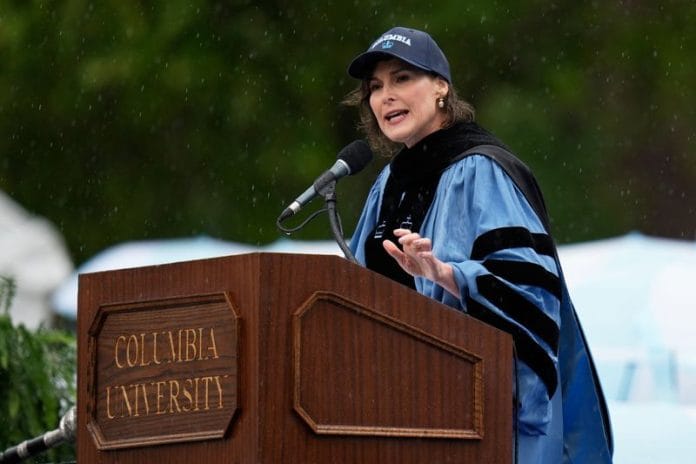(Reuters) -Columbia University’s agreement to pay over $220 million to the U.S. government in a settlement with President Donald Trump’s administration to resolve federal probes was not capitulation but a means to restore vital federal funding, the university’s acting president said on Thursday.
Trump has targeted Columbia and other universities since returning to office in January over the pro-Palestinian student protest movement that roiled college campuses last year.
Harvard University is fighting the Trump administration in court and critics have likened the Columbia deal to extortion.
Columbia’s acting president, Claire Shipman, said the university could have won short-term legal victories against the government but would have faced the long-term loss of billions of dollars in funds for cutting-edge research, like finding a cure for cancer.
She said the school would have also faced the potential revocation of the visa status of thousands of international students.
“This was not capitulation,” Shipman told CNN in an interview, adding that the deal protected the university’s “academic integrity.”
Under the settlement, Columbia will pay $200 million to the U.S. Treasury and a further $21 million to a fund to resolve alleged civil rights violations against Jewish employees following the October 7, 2023, Hamas attack on Israel, senior administration officials said.
The fund is for janitors caught inside Columbia’s Hamilton Hall during a protest as well as Jewish faculty and staff, said an official, calling it the largest employment-discrimination public settlement in almost 20 years and biggest on record for antisemitism.
The deal comes after the Trump administration in March penalized Columbia over how it handled last year’s protests by canceling $400 million in federal funding. It contended that Columbia’s response to alleged antisemitism and harassment of Jewish and Israeli members of the university community was insufficient.
Education Secretary Linda McMahon said that Columbia agreed “to discipline student offenders for severe disruptions of campus operations, make structural changes to their Faculty Senate, bring viewpoint diversity to their Middle Eastern studies programs, eliminate race preferences from their hiring and admissions practices, and end DEI (diversity, equity and inclusion) programs.”
The agreement calls on Columbia to appoint an administrator to oversee the three-year accord and spells out that a provost will review hiring and other practices in its Middle East and other programs, and appoint a student liaison to help address antisemitism issues.
Columbia law professor David Pozen called the agreement a “shakedown” and said it set a precedent for “pay-to-play” deals the Trump administration is seeking with other schools.
“The agreement gives legal form to an extortion scheme,” Pozen said in a blog post, calling it the first time antisemitism and DEI have been invoked as the basis for a government-enforced restructuring of a private university.
Shipman said the agreement contained no provisions that “shall be construed as giving the United States authority to dictate faculty hiring, university hiring, admissions decisions, or the content of academic speech.”
Last week, Columbia adopted a definition of antisemitism that equates it with opposition to Zionism. Critics argue anti-Zionism is not inherently antisemitic.
Campus protesters demanded an end to U.S. support for Israel’s military assault on Gaza and a commitment that the university will cease investing any of its $14.8 billion endowment in weapons makers and companies that support Israel’s occupation of Palestinian territories.
The government has labeled pro-Palestinian protesters as antisemitic. Protesters, including some Jewish groups, say the government has wrongly conflated their criticism of Israel’s actions with antisemitism and their advocacy for Palestinian rights with support for extremism.
“We are not denying the very serious and painful challenges our institution has faced with antisemitism,” Shipman, a former journalist and Columbia student, said in a statement.
(Reporting by Andrew Hay; Editing by Donna Bryson, William Maclean and Matthew Lewis)
Disclaimer: This report is auto generated from the Reuters news service. ThePrint holds no responsibility for its content.






